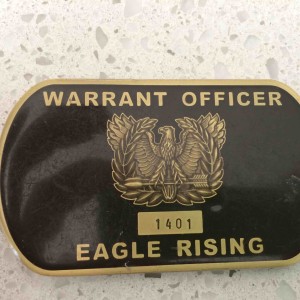My knapsack is my go-to place.
It’s got everything in it – passports, computer, pictures of my wife and daughters, just in case I need to make a quick exit.
 But there’s one thing I treasure that may seem weird: my U.S. Army warrant officer badge.
But there’s one thing I treasure that may seem weird: my U.S. Army warrant officer badge.
For several years when I was at Kansas State, I would give talks about food safety for folks headed to Afghanistan or Iraq to work on projects. I always felt goofy because there were many in the audience who knew far more about such safety matters than I did.
A couple of years ago I went to Germany to hang out with U.S. Army types and talk mainly about sprouts.
I had a few beers with Greg.
“The Preventative Medicine and the Veterinary Public preventive medicine type functions – you actually are taking care of problems before they happen,” said Chief Warrant Office 4 Gregory Scher, veterinary technician with 86th Combat Support Hospital.
Army regulation 40-657, Veterinary/Medical Food Safety, Quality Assurance and Laboratory Service, sets out all of the job responsibilities of Veterinary Food Inspectors and Preventative Medicine Specialists.
Between the two departments, food served on military installations the world over is checked for compliance starting at the farm where it is first grown or raised to the serving line, and everywhere in between.
“As far as food safety goes, the military’s probably got the safest food in the world because we are actually monitoring the food all the way,” he said. “As far as the flavor, we take no credit.”
Scher said he was also trained by the state of Washington as a health inspector. Other officers receive degrees in health education and food science. Veterinarians that want to perform inspections can receive extra training as well, becoming Veterinary Preventative Medicine specialists.
Scher and his team deploy with 86th CSH and are in charge of checking that all food from local sources meet Army standards.
“We are responsible for the sources of food in Afghanistan and then everything that’s coming into Afghanistan, making sure it is coming in the proper condition and within the contractual requirements,” Scher said.
He said because almost all food sent from the United States would be spoiled by the time it reached Afghanistan, many contractors sub-contract with companies in countries closer, such as Germany. The veterinary core officers do commercial sanitary audits on those factories.
Although they are not part of the Federal Department of Agriculture, Scher said they fill the position for the military outside of the United States.
“We’re the ones that are going to the factories and making sure they’re within the Army and federal standards,” he said.
When the food arrives on a post, his team rechecks it to ensure it has not been contaminated in transit.
They also have the authority to extend the shelf life of foods that are near or past their use by date.
“When you go to an [Army and Air Force Exchange Services] shoppette, you’ll find a whole lot of potato chips that are half off,” Scher said. “The reason why is it takes the entire shelf life printed on the label for them to even get to Afghanistan, or else when they get there they might have just a week or two left.”
